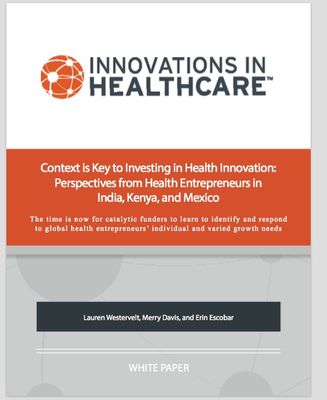In emerging markets like Kenya, India, and Mexico, entrepreneurs are launching new and exciting ways to deliver healthcare. This groundswell of innovation is vitally important—many of these companies are poised to fundamentally change health and healthcare in their home countries and beyond.
But the majority of fundraising support offered today in these ecosystems goes to help established businesses or blueprint-stage ventures—a trend that has left healthcare enterprises in early stages of growth struggling for high-quality backing.
Innovations in Healthcare has released a new white paper “Context is Key to Investing in Health Innovation: Perspectives from Health Entrepreneurs in India, Kenya, and Mexico” that examines these issues and offers five keys to closing the gap between funders and innovators.
This report, supported by the Pfizer Foundation, synthesizes discussions facilitated by Innovations in Healthcare during three workshops between September 2015 and March 2016 in India, Kenya, and Mexico, in collaboration with local partners Intellecap, Open Capital Advisors, and New Ventures, respectively.
Our primary intent with these workshops was to offer entrepreneurs the opportunity to build capacity for fundraising. The workshops also provided us the opportunity to explore entrepreneurs’ experiences related to securing financing. We synthesized the contributions and viewpoints of individual entrepreneurs who participated in the workshops, along with our own research into this new white paper.
What did we find?
- Navigating fundraising complexity is a key factor in successfully growing an entrepreneurial business operating in Kenya, India, and Mexico. Our paper provides an overview of the fundraising landscape in each country, using four distinct categories: state of the sector, type of capital available, role of the government, and support mechanisms available to entrepreneurs.
- Philanthropic capital fuels healthcare research, helps develop local talent, and supports other types of capacity-building—all necessary ingredients in fostering business growth in a given sector. Yet a number of key challenges limit entrepreneurs’ ability to access philanthropic capital, including difficulty keeping up with changing donor interests and requirements, managing cash flow with grant funds in the mix, balancing multiple funders’ interests, and, put simply, a shortage of this type of funding.
- Investment challenges were noted across all three countries. We found increasing interest in the healthcare sector among investorsof all types. For most, and particularly impact investors, the space is relatively new, and in all three settings there are limited (if any) funds focused solely on healthcare. For these reasons, raising investment money can be challenging, due to the difficulties of working with investors who are not local, problems navigating dissimilarities in financial and business standards, aligning expectations around impact and returns, and barriers to accessing debt.
- A few challenges appear consistently across countries and funding types, including time limitations, a limited understanding among entrepreneurs of their own capital needs, a mismatch of available capital and entrepreneurs’ capital needs, and difficulty connecting with potential sources of capital.
So what does this mean for funders and innovators?
The challenges detailed above point to a lack of alignment and understanding between funders and innovators—a situation that is not surprising, given the recent rapid growth in the healthcare innovation landscape. There is real opportunity for funders to pioneer a new approach to supporting healthcare entrepreneurs in these settings. To read more about the challenges and opportunities, download our report, available here.

